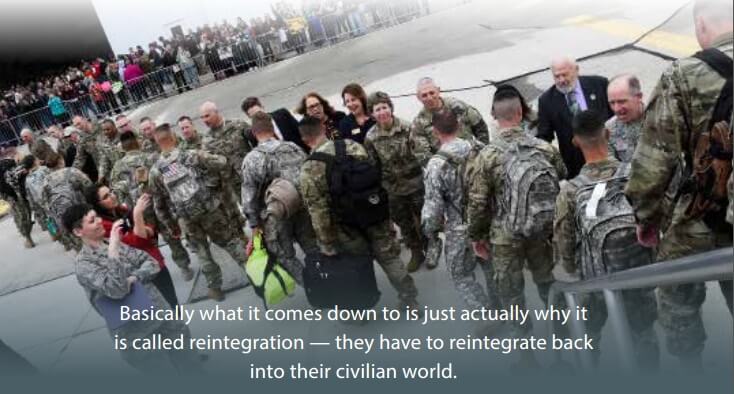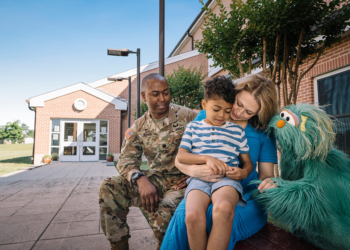Reintegration after a deployment is one of the most highly anticipated moments for any service member.
Reintegration is the period attached to homecoming when military personnel transition back into life on the home front. It is a given that this timeframe is an exciting one, but once the pomp and circumstance fades, issues may arise.
These challenges can be common, or there may be some areas that require extra attention. The unique nature of sending the military to diverse locations, then bringing them back to their everyday lives led the Department of Defense and supporting organizations to devise programs that can complement this stage.
Programs to help those coming and going
It is no secret that the demands on the service branches have amplified since 9/11, leading to more frequent deployments, shorter dwell times, and increasing strains on military households. It is easy to think that you and your family will ease right back into a routine, but experts warn that challenges can come at any time — even long after your reunion
Finding support that suits your needs
In addition to navigating benefits and finding employment, service members or families may face other challenges, such as adjusting their relationships to changes that come with separation. Military OneSource offers confidential, non-medical counseling options to connect with a professional, on your terms, in a manner that best works for you.
Senior program analyst Jena Moore works with the Military Community & Family Policy non-medical counseling program office. They offer counseling in-person, over the phone, and via live chats. She says there are two reasons people most often contact them during the return and reunion phase.
“What we have seen, or what we find through both of our non-medical counseling programs, of Military OneSource and the Military and Family Life Counseling program … we find that there’s a variety of reasons people seek counseling, but the things that pop for us specific with the reintegration is the communication and relationship,” Moore said. “Those are reasons that we see that service members and family members, as well as coming together as a couple or a family seek counseling through our programs.”
Counseling services are available individually, as a couple, or for a family. To get started, visit www.militaryonesource.mil/confidential-help or call 800-342-9647.
Additional no-cost counseling is also offered by Give An Hour — a nonprofit organization that connects volunteer mental health professionals to veterans and their families. To search for providers, visit www.giveanhour.org.
Tips for returning home after deployment
Your deployment is over and now you are returning home — let reality set in. Next it’s time to reconnect with your family and friends and return to your “normal” life. There can be challenges during the reintegration process but these helpful reminders can make the transition a little smoother:
• Communicate with your loved ones
• Be patient and go slow
• Focus on the positive
• Know when to seek help
With these and many more tips, your homecoming can be rewarding for you and those you love.
Understanding reintegration
It can sound so simple to return home, but it takes time to adjust. Here are some tips to help you:
Communicate details of your return plan. You might leave a day early or later than planned. Keep your loved ones informed so your welcoming party is there when you arrive.
Take your time and be patient. You may feel out of sync with your loved ones or friends. You might feel disconnected immediately, or even days or months after returning home. Go slow and talk. Fatigue, confusion and a change in pace can lead to a short temper. If you have children, be prepared for your toddler to throw a tantrum or for your teenager to give you some attitude. Kids are forever testing parents. Remember everyone is adjusting — be patient, keep the lines of communication open and remember there is no “right” way. Do what is best for you and your family.
Make time in your schedule for family activities. Include one-on-one time with your partner and each of your children.
Focus on the positive. Individually, tell your family members you are proud of them, and you appreciate them.
Watch your spending. There is nothing wrong with going out and celebrating your return. However, be careful not to overdo the celebrations — stay on track with finances.
Know when and where to seek help. If you, your spouse or other family members are feeling signs of physical or emotional stress it’s important to seek help — the earlier the better. While leaning on a comrade might be helpful, sometimes it’s not enough. For confidential help, contact your installation’s Military and Family Support Center, Military OneSource at 800-342-9647, Defense Centers of Excellence at 866-966-1020 or the Department of Veterans Affairs at 800-905-4675 EST or 866-496-8838 PST. You may also visit the Real Warriors website at www.realwarriors.net for additional support.
Remember, it’s normal to go through an adjustment period post-deployment, and it is OK to seek help. Taking care of your country is your job, but don’t forget to take care of yourself and your family.
Six tips for readjusting to family life
When you were deployed, you probably thought a lot about getting back home to your family and kids. Now that you’re back, along with feelings of relief and joy, you might be experiencing unexpected stress or anxiety.
What you’re experiencing is common. It can take time to readjust to being together again as a family. Below are tips and tools to help you smoothly maneuver through reintegration.
1. Be patient
Understand that both you and your family likely experienced changes while you were away. It may take longer than a day or week to reconnect.
2. Be caring and firm
Tell your kids how happy you are to see them, and how much you missed them. A simple hug and the words “I love you” are always a good start.
But remember, while some parents may feel guilty about the time spent away, it’s important not to give in to all of your kids’ demands. Children still need loving parents who set boundaries.
3. Make time for family
Set aside time for family activities, including one-on-one time with each of your children. Take a trip to a park, watch a movie, take a walk, go for a bike ride or play their favorite video game.
4. Listen and learn
Talk with your kids about their lives. Try asking them about what they learned in school. Show interest in the things that are most important to them. A helpful way for children to share their memories is to create a scrapbook of their experiences during your deployment. Your children could also share pictures they may have taken.
5. Accept guidance
Understand that your spouse or partner has spent more time with your kids than you recently. Accept their advice, learn from them about how your children have grown, and work with them to develop new routines and rules.
6. Get support
If you continue to have trouble reconnecting, reach out for help. Below is a list of organizations that offer free support and resources:
The FOCUS Project offers Family Resilience Training for military families. The organization’s online program, FOCUS World, provides educational resources for parents and children to help with deployment-related challenges. Visit www.focusproject.org for more information.
Try visiting your local Vet Center. These community-based Department of Veterans Affairs programs provide readjustment and reintegration counseling to Veterans who have served in combat zones. Visit www.vetcenter.va.gov to find one near you.
A Head for the Future, the traumatic brain injury awareness initiative of the Defense and Veterans Brain Injury Center, can help you recognize and recover if you are coping with a TBI. Visit http://dvbic.dcoe.mil/aheadforthefuture for more information.
Psychological Health Coordinators are qualified to help provide support for PTSD or other concerns and can connect you with local resources. For immediate, confidential help, call the Military Crisis Line 24/7 1-800- 273-8255 (TALK) and press 1; or text 838255 for support.
Chaplains are also available in your state as an additional resource for support. They can help Soldiers of all faiths sort through emotions, thoughts, and feelings. Visit www.guardyourhealth.com/suicidal-crisis-support/ for more information about this resource.
— Courtesy of Guard Your Health
Read comments












































